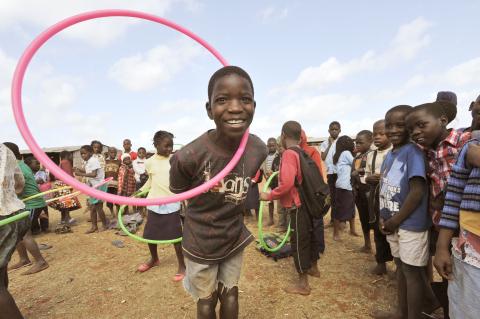You are in this section
GUEST BLOG: Does sport and development have a branding crisis?
Paul Hunt, Project Officer at the International Platform on Sport and Development, writes a guest blog for International Inspiration (IN) about the current contestations of sport for development work - the blog follows the Sport for Development: A Catalyst for Change’ conference, held at Wilton Park in June this year.
Working in sport and development can create opportunities to meet representatives of an eclectic group of institutions, from governments and NGOs to sports federations and universities. In addition to carrying out some important work, such events are characterised by a lot of energy and enthusiasm, partly as a result of this diversity. But there are also criticisms which suggest a lack of focus and raise questions over whether organisations with such different aims, priorities and approaches have much in common and can even really be considered a sector. Sport and development organisations are not even united on what our work should be called. sportanddev.org tends to go for “sport and development” but “sport for development”, “sport for development and peace” and “sport for social change” are among the most common alternatives we hear on a regular basis, often reflecting the priorities of the speaker: what do we emphasise – sport, development, peacebuilding?
Despite the challenges it entails, we should remember that diversity also opens doors which we can use to our advantage:
- Shared learning with different stakeholders. A Premiership football club and a grassroots educational organisation may have different priorities but the International Working Group on Safeguarding Children in Sport, for example, has shown that organisations who appear to inhabit different worlds can together make progress on issues of mutual importance.
- A large pool of potential supporters, activists and employees. Sport and development can inspire the sports fan who has never thought seriously about development as much as the NGO activist who is looking for a different approach.
- The ability to advocate on different levels. Access to key decision makers as well as institutions with the influence to advocate on our behalf increases the potential for advocacy campaigns to be successful.
- Partnerships which can be extended further. The diversity of sport and development has led to many becoming skilled networkers and partnership builders – looking outside the box can open up some promising opportunities.
- Potential access to a variety of funding streams. An NGO using football to transmit HIV prevention messages may be eligible to apply for funding from both those looking to finance sport projects and those whose priority is health.
Put more simply, we have a niche, and connecting with others who share this niche allows us to leverage it more effectively. However, we should be careful that taking advantage of a niche doesn’t turn us into a clique. Achievements should be communicated clearly and with confidence but also express inclusiveness and humility. The use of jargon only familiar to those already engaged with sport and development risks alienating potential supporters, while experience has shown that enthusiastic but unsupported statements about “the power of sport” can lead to accusations of sport evangelism.
If we view ourselves as a sector, then our organisations belong to more than one. It makes sense for an organisation promoting the rights of people with disabilities, for example, to collaborate with others doing the same, whether or not they are using sport. Some are turned off by a belief that the tool is sometimes emphasised more than the aims or achievements, which can be avoided by recognising that sport is one of a number of effective tools. The success of programme implementation will improve at the same time.
The question of whether sport and development is a sector is largely a semantic one, but the number of conferences, events and discussions connecting its actors shows that many do feel a sense of shared purpose with others using sport, whether or not their goals are the same. Over the last 13 years, sportanddev.org has played a role in creating this feeling of belonging to a community by opening up channels of communication and creating an online space for discussion. However we label ourselves, sharing experiences has improved programme effectiveness while increased interconnectedness has raised sport and development’s profile. Let’s not forget to include others in the conversation and reflect that objective in the way we communicate what we do.
Find out more about sportanddev.

